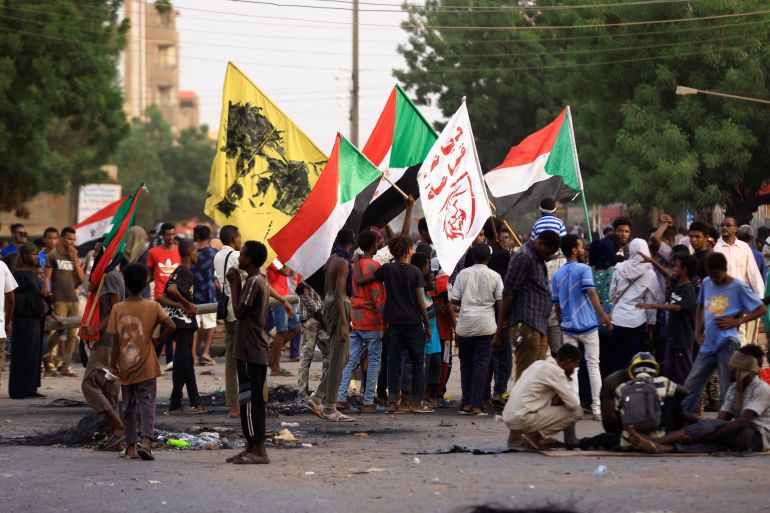Sudan activists reject army offer as ‘ruse’, urge more protests
Sudan’s main opposition bloc rejects the army’s proposal to make way for civilian rule as a ‘transparent manoeuvre’.

Sudan’s main civilian political bloc, the Forces for Freedom and Change (FFC), have rejected a proposal by the country’s coup leader to make way for democratic rule as a “tactical retreat” and have urged people to continue protesting.
Army chief Abdel Fattah al-Burhan, whose power grab last October removed the FFC, had pledged in a surprise move Monday to “make room” for civilian groups to form a new transition government.
Keep reading
list of 3 itemsSudan’s military strikes disputed region bordering Ethiopia
One-third of Sudan’s population faces hunger crisis: UN
But the FFC on Tuesday called for “continued public pressure” on the streets after days of protests and dismissed al-Burhan’s move as a “tactical retreat and a transparent manoeuvre”.
“The coup leader’s speech is a giant ruse, even worse than the October 25 coup,” FFC leader Taha Othman said.
“The crisis will end with the coup leaders resigning and the forces of the revolution forming a civil government,” he said.
“A resolution lies first in having the military relinquish power and letting revolutionary forces form a fully civilian transitional government,” a statement released by the group said.
Al-Burhan said late on Monday that the military would no longer participate in the talks facilitated by the United Nations, African Union and the regional IGAD bloc, wanting instead “to make room for political and revolutionary forces and other national factions” to form a civilian government.
The announcement came eight months after the coup deposed civilians from a transitional administration, sparking widespread international condemnation and aid cuts to the northeast African nation.
Just hours after his surprise announcement, al-Burhan flew to Kenya for a summit of the Intergovernmental Authority on Development (IGAD), an eight-member regional bloc, which began on Tuesday.
Al-Burhan’s televised address came as hundreds of anti-coup demonstrators continued to protest.
On the streets of Khartoum, where demonstrations have been continuing for days, protesters again defied security forces and held firm to their makeshift barricades.
“We don’t have confidence in Burhan,” said Muhammad Othman, perched on a pile of bricks. “We just want him to leave once and for all.”
The FFC has so far refused to take part in talks with military leaders, which were launched under international auspices in an effort to restore the transition to civilian rule.
Security forces – as they have done repeatedly during the long-running protests – sought to break up the crowds by firing barrages of stun grenades and tear gas, according to pro-democracy medics.
According to the medics, Sudanese security forces descended on the anti-coup sit-in to try and disperse protesters in Khartoum, wounding at least 11 people. Security forces also used tear gas on the demonstrators in the city’s neighbourhoods of Burri and al-Jawda late Monday, according to the Sudan’s Doctors Committee, which tracks protest casualties.
Some of those hurt were hit by tear gas canisters and other solid objects in the head and elsewhere, the group said in a tweet.
‘Core grievances remain’
Sudan, one of the world’s poorest countries, has seen only rare interludes of civilian rule. The latest coup not only worsened a political crisis but has pushed Sudan deeper into a dire economic slump.
International actors have been pushing for civilian and military leaders to negotiate a return to a democratic transition they had started after the 2019 overthrow of Sudan’s longtime leader Omar al-Bashir.
Kholood Khair, of the Khartoum think-tank Insight Strategy Partners, said she believed Burhan’s announcement was made to put “the pressure on the civilians” but warned that it might change little on the ground.
“There’s no talk of accountability,” Khair said, noting that “core grievances remain”.
Khair warned that the protesters feared that al-Burhan would put Bashir-era “Islamists back in government”, and that the coup leader was setting military and allied armed groups up to “retain economic privileges” in the future.
Sudan’s military dominates lucrative companies in sectors from agriculture to infrastructure.
Al-Burhan said on Monday that “the formation of the executive government” will be followed by “the dissolution of the Sovereign Council” – the governing authority formed under a fragile power-sharing agreement between the army and civilians in 2019.
Also created would be a “Supreme Council of Armed Forces”, to be in charge of defence and security.
The Council would combine the regular army and the paramilitary Rapid Support Forces, a much feared and powerful unit commanded by al-Burhan’s deputy, Mohamed Hamdan Daglo.